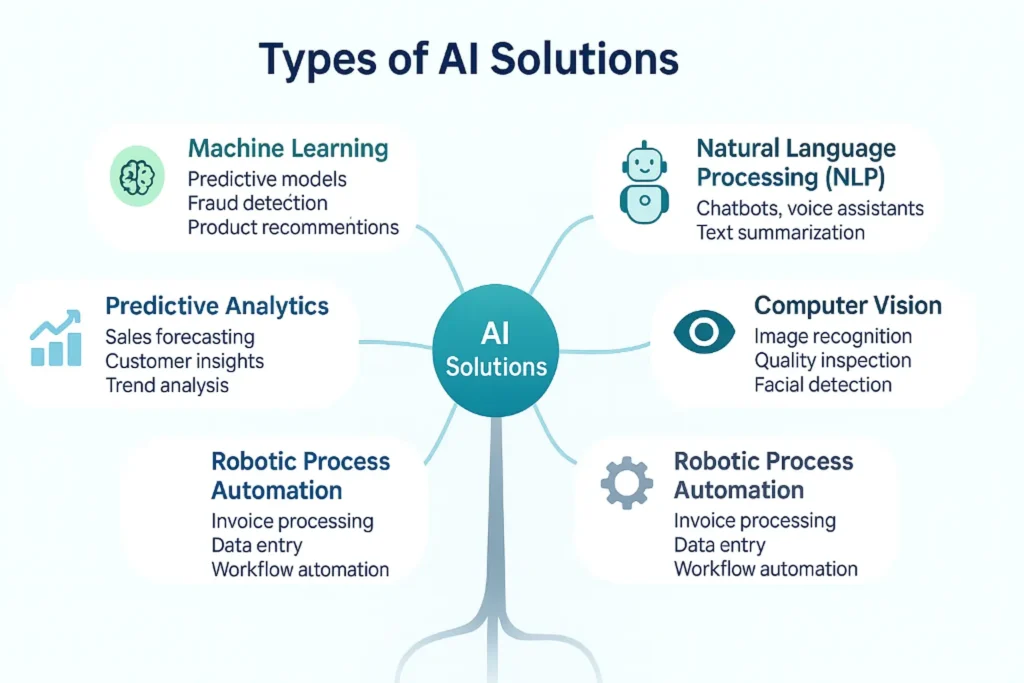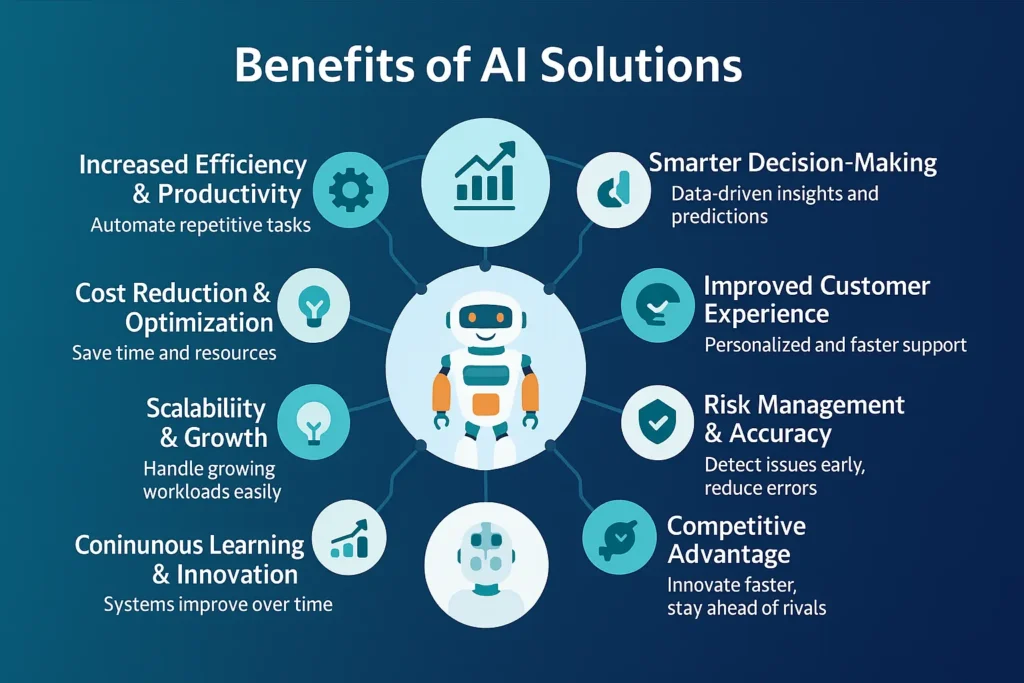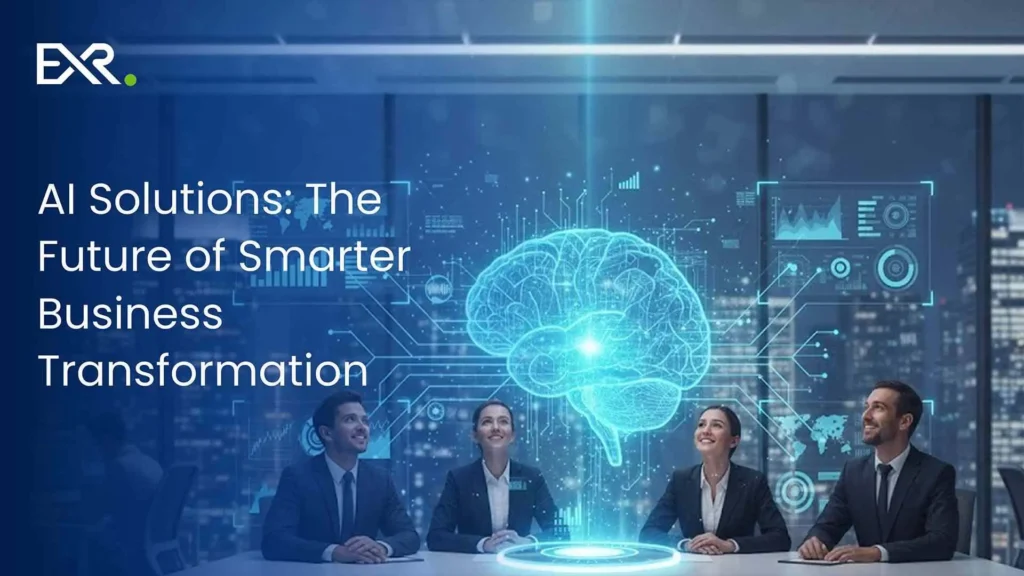Do you ever feel like your business is constantly repairing problems as they come up rather than preventing them before they occur?
You spend hours extinguishing fires, poring over spreadsheets, replying to customers… and sense there must be a quicker, better way to help people. Other businesses just seem to grow effortlessly, introducing new products on command, predicting market trends and staying one step ahead.
So what’s their secret?
They’re not working harder. They’re becoming smarter with AI-based solutions.
Around the world, large and small companies are integrating AI into their business in hopes of cutting costs, saving time and making better decisions without adding a whole new staff member to the payroll.
In this easy-to-read guide, you’ll learn what AI solutions are and how they work, and find out how to get started integrating these tools into your own business operations even if you lack a technical background.
Let’s put it in a way that is easy to comprehend.
What Are AI Solutions and How Do They Work?
AI solutions are intelligent computer systems that can learn and make decisions from data, like humans, but faster and with fewer mistakes.
They don’t adhere to fixed rules the way humans do; rather AI solutions find patterns, make inferences and automate routine tasks. They help businesses, for example:
- Understand customers better
- Spot problems early,
- And make smarter, data-based decisions.
There’s a quick way to visualize it:
Now imagine you have an assistant or many of them who can find answers in the mountains of data. It’s what AI solutions do for your business.
How AI Solutions Work (In Layman’s Terms)
- Gather Data: Your business is creating data every day; sales, website visits, customer messages, machine performance and so on.
- Patterns are Analysed: AI tools crunch this data and identify patterns that humans might overlook.
- Forecast or Decide: The system might recommend what comes next, or it could take action itself, such as sending a targeted offer or raising the alarm about suspicious behavior.
- Learn and Improve: The more data it sees, the smarter it gets.
McKinsey believes companies who successfully apply AI-driven applications could increase their profits by as much as 20 per cent through automation and better decisions.
In brief: AI solutions function by translating data to action.
They enable companies to go from reacting to problems to predicting and preventing them.
Are you ready to explore how AI can transform your business? We’ll help you in sketching out the next steps.
Types of Artificial Intelligence (AI) Solutions

AI isn’t one single technology. It’s a union of intelligent systems, each one tackling a different class of problems.
From digesting patterns in data, to reading human language or automating tasks, each type of AI does something different.
Let’s explore the main ones:
Machine Learning
Machine learning sits at the core of many AI solutions. It is what allows computers to learn from data and make predictions, without being explicitly programmed on what action to take at every instance.
The more data it analyzes the better it becomes.
For instance, a retail website might use ML to suggest items that you’re likely to want, and a bank can use it to pick up suspicious transactions before they cause harm.
Machine learning is how data becomes insights and how businesses make smarter, faster decisions with their data.
Natural Language Processing (NLP)
Natural Language Processing, or NLP, is how computers understand and use human language.
It’s what enables you to speak to Alexa, or ask a question of ChatGPT, or type back and forth with a chatbot on a webpage and have it actually provide a useful response.
NLP based AI programs are how businesses today get internal work done, answering your emails queries, and more important tasks like document summaries or real-time language translations.
Put simply, NLP enables AI to communicate as a human does.
Computer Vision
Computer vision is how AI “looks” at the world. It can recognize, categorize and understand images and videos, just like your eyes, only faster.
- In health care, it can aid doctors in reading medical scans.
- In manufacturing, it finds small flaws in items.
- In security, it drives facial recognition systems.
Computer vision enables AI to react to something besides what it reads.
Predictive Analytics
Predictive analytics relies on past information to guess what’s likely to happen next. It is among the most realistic sorts of AI solutions for businesses.
- Retailers use it to predict sales.
- Marketers apply it to forecast which leads are likely to convert.
- It’s used by logistics teams to dodge supply delays.
Predictive analytics helps companies become proactive, by identifying patterns in old data and predicting what might happen before it does.
Robotic Process Automation
Robotic Process Automation, or RPA, it’s all about efficiency. It’s the part of your business that handles those simple, repetitive tasks that really don’t require human judgment, things like sending invoices, updating records or moving data between applications.
Think of it as a digital worker who never gets tired, never makes mistakes and allows your human team members to concentrate on creative or strategic work.
With AI, RPA gets even smarter, it learns from patterns and automatically addresses exceptions.
Each of those AIs solves a separate part of the puzzle. But bring them together, as in machine learning and NLP, or computer vision and predictive analytics, and you unlock powerful systems that can change how your company operates.
Related: https://exrwebflow.com/role-of-ai-business-solutions/
Applications of Artificial Intelligence (AI) Solutions
One of the many fine things about AI solutions is how versatile they are. They can be used in almost any business or industry, no matter the size or specific focus of the industry. From dumbing and shucking blind dates to improving decision-making, AI is already changing the world in which we live.
The following is a list of some common applications:
AI in HealthCare
With AI, doctors can have early detection of disease and read X-rays faster than before. It can even predict the probable risks faced by patients based on their medical histories. AI in the Healthcare industry like Hospitals use AI solutions for analysis of lab results, managing appointments and improving the care they provide patients.
AI in Banks and Fintech Companies
AI is. employed by banks to detect fraud, create truly personal credit ratings and advise on personalized finance. For example, AI might in an instant pick out strange card activity, or assist investors in managing their stocks and bonds with predictive models.
AI in Retail and E-commerce
AI is transforming online stores by recommending products, predicting stock demand, and automatically optimizing pricing. When you see a “You may also like…” section, that’s AI working behind the scenes. Learn more about AI in E-commerce solutions here:
AI in Factories and Manufacturing
AI keeps factories running at peak performance. It foresees when machinery may require servicing, monitors production quality control and improves speed of manufacture, cutting down on lost time with stopped bonuses all round.
AI in Marketing and Customer Service
AI chatbots, email personalization and sentiment analysis tools enable businesses to better connect with their customers. These solutions supply the answers to most questions, divide the public into client segments and design campaigns which actually match customer requirements.
AI in Legal and Intellectual Property
AI solutions for the Legal-tech Industry are now used by law firms to review contracts, craft patents and conduct legal research. Hours spent in what used to be manual reading are replaced by minutes devoted to analysis, enhancing precision and boosting productivity.
AI in Logistics and Transports
AI helps enterprises fine-tune their distribution routes, manage their fleets and trim fuel consumption. From predicting delays to scheduling maintenance, AI ensures that operations run smoothly wherever they may happen to be.
In short, wherever there is data, there is a place for AI solutions to speed up, give it more brainpower to chew on and so make it easier.
Need customized AI solutions that work? Hire AI Developers to make tailored solutions which fit into your business plan.
Benefits of ArtificialIntelligence AI Solutions

Today’s business is not only using AI as a tool for innovation, it is using it to survive. With AI solutions, companies can not only automate processes, but fundamentally transform the way they work, think and develop.
Increasing Efficiency and Productivity
AI solutions are capable of managing the routine tasks, such as data entry, replying to emails, and generation reports, which gives back time for teams to focus on strategy and creativity. Such a shift not only improves efficacy, it reduces weariness. Data from Deloitte show that through automation can increase efficiency in some cases by up to 60%, but what really counts is helping businesses to do more with less.
Making Smarter Decisions
AI tools can process huge amounts of data with lightning speed and highlight patterns which may have escaped human attention. This results in quicker decisions with higher accuracy for roles such as marketing, finance, or operations. According to PwC, companies that use AI-driven insights offer business decisions five times faster than those who rely only on manual analysis.
Saving Costs and Using Resources Better
With the help of AI solutions, companies can predict outcomes and automate processes which helps reduce negligible expenditure. For example, predictive maintenance in manufacturing reduces repair costs by as much as 25%. Across different industries AI reduces operational wastage while deploying sparse budgets more strategically, all drivers in the long run of profitability.
More Satisfying Customer Experience
AI-powered chatbots, personal recommendations, and voice assistants can make it both faster and more fulfilling for clients to get their questions answered. A Salesforce report found that more than half of consumers would now be more inclined stick with brands which used AI to tailor their experience for them. In other words, AI solutions help businesses to know what the customer wants before he says it.
Risk Management and Error Elimination
AI systems are constantly comparing today’s data against it own predecessors and its other standard references, permitting any abnormalities to be spotted early by a company. Banks use AI to detect fraud; logistics enterprises put them to work foreseeing deliveries delayed. This high-performance yet flexible solution brings a proactive approach to risk management that guarantees long-term development.
AI Competitive Edge
Businesses that adopt AI early out-innovate and out-perform their rivals. With real-time data intelligence they can modify pricing, introduce new offerings or adjust operations before others catch up. A paper in the Harvard Business Review reports that businesses with sophisticated AI strategies are twice as likely as their peers to head their industries.
Scalability and Sustainable Growth
With AI behind it, as your business grows, so it does. Unlike traditional systems, which need more staff and infrastructure as workloads increase, AI automatically handles these tasks. It is this flexibility which allows startups and established businesses to expand more rapidly while maintaining quality or power of control.
Constant Learning and Continual Innovation
The more AI systems process data, the better they get. This ongoing learning cycle means performance improves over time; and gradually businesses become stronger and more flexible. AI not only keeps you on the ball, it generates a momentum for future innovation.
Discover a place where automation and design go hand in hand. At EXRWebflow, smart systems meet smooth digital experiences.
How to Implement AI Solutions in Your Business?
Adopting AI solutions shouldn’t feel oppressive. The watchword is: relatively modest to start with, the background strategic, Build momentum by adding new functionality later. And here’s a simple roadmap for you to follow:
Identify the Right Problems to Solve
The first step is to identify the areas that are slowing down your team. Repetitive tasks, too much data to handle, or decisions put off for too long should be focused on where AI can clarify the situation. What pain points lie ahead? Get one to two examples fixed painlessly, such as small-scale deployment of chatbots, predictive algorithms in customer support systems and so on.
Gather and Prepare Quality Data
Data is what artificial intelligence systems learn from. The better the data, the more accurate are results on behalf of your AI-driven systems. So clean up your business info, remove any duplicates and make sure your systems can consistently log data.
Choose the Right AI Tools or Partners
You don’t have to start everything from zero. Many off-the-shelf AI solutions already exist, from chatbots and analytics platforms to full automation tools. Select one of them in line with your goals and which will integrate smoothly into the existing systems of your own business.
Start Small with a Pilot Project
First, try out your fledgling AI solution on a small scale. Then assess how it fairs in action, gather feedback from users and tweak the settings until the wrinkles are ironed out. This method lowers risk while also giving your AI strategy a boost in credibility.
Train Your Team and Build Trust
AI works best when people know how it operates and can trust it. Consequently, educate your team on the ins and outs of their AI system: what data it uses, which parts of its role it supports. Once AI is something your people are familiar with, usage becomes trivial.
Measure Outcomes and Gradually Expand
Track measurable results such as time saved, customer satisfaction scores raised or lower costs incurred. Once you have verification that the going is good, make your AI solutions live everywhere, step by step, not all in one go.
Require advanced tech expertise? Hire AI Engineers who can help you make data-driven solutions that work.
Challenges and Considerations of AI Solutions
Though all these gains are remarkable, AI solutions may face challenges that demand thought and preparation.
Quality of Data and Privacy
AI is no better than the data it organizes. Partial or lopsided information, obsolete data, or may even lead to misleading forecasts. As a business, one must ensure data that is high-quality, inviolable, and ethically acquired to remain credible and precise.
Existing System Integration
Already, many businesses depend on software used in the administration of accounts, CRM, or operations. Without technical preparation, it can be hard to bring in new AI tools. Purchasing AI solutions that fit in well with your present systems is important to avoid damage.
Costs and Scalability
Training or creating AI systems in the first place can be costly. However, most companies regain this expense with long-term efficacy gains. Start small, measure ROI, and then scale when the model proves valuable.
Skills and Training
To function well in AI, people need to understand both technology and business. Re-skilling your own squad or bringing in AI experts can plug this gap and ensure a successful implementation.
Moral and Regulatory Busybody
As AI becomes more common, so do questions of fair play and transparency in data ethics. Companies must follow regulations emerging and show transparency in how a decision is reached by AI, especially in fields like finance, hiring, and healthcare.
Handling the Changes
Simply introducing AI may provoke a backlash or fear from your staff. Open communication, clear explanations, and letting everyone know that AI is there to help the balance shifts a little more smooth and gives people confidence.
Navigating the future of AI solutions
The future of AI solutions is not to replace humans, instead it is about extending human possibility. Today, companies that responsibly adopt AI will lead tomorrow’s industries.
Welcome to the age of Generative AI, Explainable AI (XAI), and autonomous systems that learn faster than ever and adapt. These pioneering works will make AI tools easier to use, more transparent, and even more tailored for the needs of individual industries.
The most pervasive shift in store is that human and AI will do more together in the future. Instead of doing everything by machine, businesses will use AI as a creative and strategic partner, making better decisions, building smarter products, innovating.
This will also bring ethics and sustainability more to the fore. Firms need to make sure their AI systems are impartial, accountable, and environmentally friendly. Whoever gets this mix right will not just gain profit but also public trust.
In short, the future belongs to those businesses that learn how to work with AI, not just how to fight against it.
Start investing in this new frontier of AI now and you’ll soon have better days on the horizon! Why not try reaching out to us today?
Contact Us!
Final Thoughts
Now, AI isn’t the future anymore, it’s already here. Whether through implementing administrative tasks of lesser complexity or producing complex decisions, AI solutions help firms work faster and smarter. The trick is to start small and build on your success, the tools will come if you do so. The companies making smart use of AI today will take tomorrow’s market lead because it’s all smart ache now, not hard sweat.
Frequently Asked Questions FAQs About Artificial Intelligence AI Solutions
What industries can benefit from AI solutions?
With AI, the solution benefits nearly every business sector, from health care and finance to marketing, logistics, manufacturing.
How scalable are AI solutions?
With AI, the solution benefits nearly every business sector, from health care and finance to marketing, logistics, manufacturing.
What are some examples of AI solutions?
Chatbots, recommendation engines, fraud detection, predictive analytics and computer vision are all good examples of AI solutions.
Who offers the best ai data labeling solutions?
Leading suppliers include Labelbox, Scale AI and Amazon SageMaker Ground Truth, for high-quality labeling tasks to suit all needs.
What’s the best solutions for ai patent drafting?
Companies like IdeaPit, Microstrategy pals and Vantage will use techniques such as NLP to streamline your IP process.


